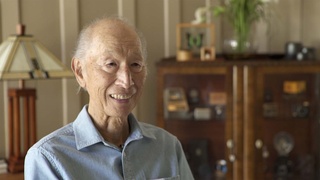Interviews
Attempts to sign up for military service
At first I thought, well, I would apply to the navy. But then the navy said they would not train anybody of Japanese ancestry, at government expense. So the dean said, well, you know, there’s the army and the Nisei are being drafted into the army. Therefore, possibly, they said, they cannot say no to you. So, I send my application to the army and I got a letter saying that, in your case, we have to really ask the war department directly. We cannot make a decision locally, so you have to wait. And then the same word came from Washington, that they were not going to train anybody of Japanese ancestry at government expense. So, therefore, they said, you’re not eligible.
Date: July 1-2, 1998
Location: California, US
Interviewer: Mitchell Maki, Darcie Iki
Contributed by: Watase Media Arts Center, Japanese American National Museum







